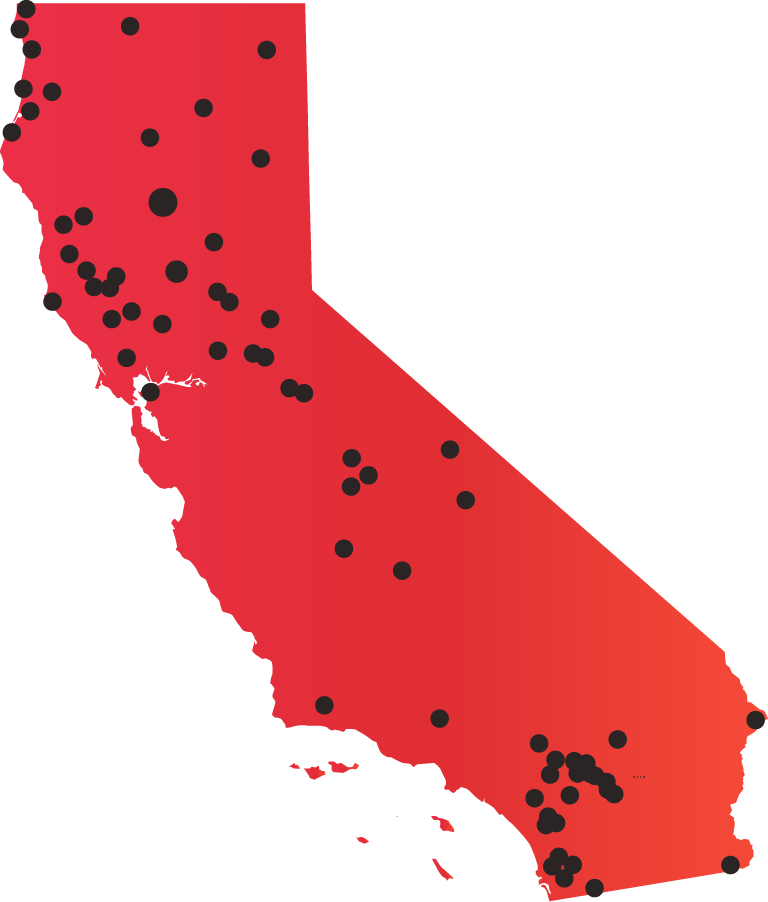State of Play
Explore the national and state-by-state impact of the casino gaming industry, as well as key regulatory and statutory requirements in each state.

-
Number of Casinos 87
-
Economic Impact $34.56 Billion
-
Jobs Supported 184,701
-
Tax Impact & Tribal Revenue Share $5.76 Billion
-
Gross Gaming Revenue $8.41 Billion (2016)
Size of circle indicates number of casinos in the area.
All location data is as of Dec. 31, 2023.
According to the California Gambling Control Commission, as of January 2024, the state of California has ratified tribal-state gaming compacts with 76 California tribes and put into effect Secretarial Procedures with four additional tribes. Of the 76 compacted tribes, 63 tribes operate 66 casinos throughout the state.
Under the 1999 compacts, tribes were limited to around 2,000 Class III gaming machines. The 2004 Compacts allowed tribes to operate an unlimited number of Class III gaming machines. The 2012 Compacts vary in the amount of Class III gaming machines allowed, with some tribes being allowed to operate over 2,000 machines.
Regulation of tribal casinos in California is done by tribes and the state. The tribes regulate tribal casinos through tribal commissions, keeping operations in compliance with local ordinances and state compacts. The state gaming commission also has a role in regulating tribal casinos, including helping with inspection of tribal gaming facilities and suitability determinations of applicants.
Generally, compacts in the state last for terms of 20 years.
AVAILABLE GAMING LICENSES
Gaming Resource Supplier License
Management Contractor License
For more information on available gaming licenses, see Regulatory Fact Sheet.
REVENUE SHARE
Tribes in California make payments to three different funds: the Revenue Sharing Trust Fund, the Special Distribution Fund, and the state’s General Fund. Currently, 43 tribes make payments into at least one of the funds. The Revenue Sharing Trust Fund receives payments from 31 tribes in the state. The Special Distribution Fund receives payments from 38 tribes in the state. The General Fund receives payments from 1 tribe in the state. Some tribes also contribute to the special mitigation funds.
For more information on California revenue share, see Regulatory Fact Sheet.
TAX PROMOTIONAL CREDITS
No
WITHHOLDINGS ON WINNINGS
Yes
STATE USE OF REVENUE
The Revenue Sharing Trust Fund is a fund created by the legislature and administered by the state gaming agency. The state gaming agency must disburse the RSTF monies on a quarterly basis as specified by the legislature. Each eligible non-gaming tribe and limited-gaming tribe in the state receives $1,100,000 per year from the RSTF. Monies in excess of the amount necessary to distribute $1,100,000 to each eligible non-gaming tribe and limited-gaming tribe will remain in the RSTF available for disbursement in future years.
The fund is used in the following ways:
• Appropriations to the Department of Alcohol and Drug Programs (DADP) for its Office of Problem Gambling.
• Funding for state regulation by the California Gambling Control Commission (CGCC) and the Division of Gambling Control in the Department of Justice.
• Grants to local governments affected by tribal casinos.
Monies from the General Fund are used to fund state programs such as K-12 education, higher education, health and human services, transportation, the Department of Corrections and Rehabilitation, California Natural Resources Agency, California Environmental Protection Agency, Business Consumer Services and Housing Agency, and other programs the legislature deems necessary.
TRIBAL USE OF REVENUE
Requirements as described in IGRA.
STATUTORY FUNDING REQUIREMENT
Money from Special Distribution Fund goes toward responsible gaming.
SELF-EXCLUSION
Compacts require tribes to set up self-exclusion programs.
COMPLIMENTARY ALCOHOLIC DRINKS
Must comply with state liquor laws.
ADVERTISING RESTRICTIONS
Advertisements must contain responsible gambling information.
ON-PREMISE DISPLAY REQUIREMENT
Signs and other materials should be available to alert patrons of toll-free responsible gambling help-line.
AGE RESTRICTIONS
Persons must be 18 years of age to participate in Class III gaming
OPERATION ON HOLIDAYS
Tribes may operate on holidays
TESTING REQUIREMENTS
Gaming devices must be approved by an independent or state gaming testing laboratory.
ANTI-MONEY LAUNDERING REQUIREMENTS
Federal compliance requirements under the Bank Secrecy Act.
SHIPPING REQUIREMENTS
Federal shipping requirements under the Johnson Act apply.
RESTRICTIONS ON POLITICAL CONTRIBUTIONS
Yes
CREDIT OFFERED TO PATRONS
Credit may be offered but is not offered by all tribes.
SMOKING BANS
No
CASHLESS GAMING & ALTERNATIVE PAYMENTS
Yes. However, California does not currently accept cryptocurrency as a form of payment for gambling transactions and explicitly prohibits the use of Bitcoin or any other cryptocurrency to purchase raffle tickets.
LEGAL SINGLE GAME SPORTS BETTING
Not allowed